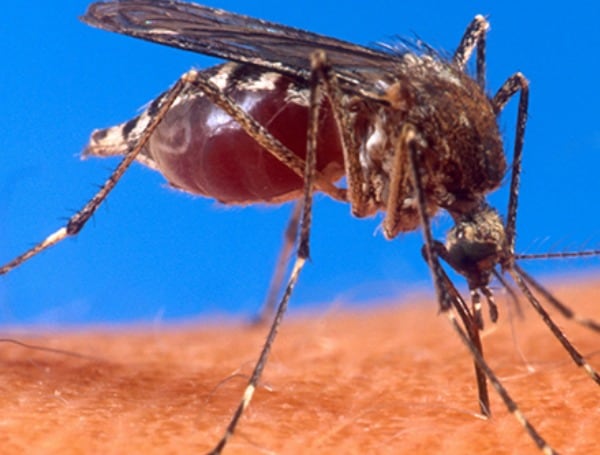BARTOW, Fla. – The Florida Department of Health in Polk County (DOH-Polk) today advised residents there has been an increase in mosquito-borne disease activity in areas of Polk County.
Two horses have tested positive for Eastern Equine Encephalitis (EEE) virus infection. The risk of transmission to humans has increased. Polk County Mosquito Control and DOH-Polk continue surveillance and prevention efforts.
DOH-Polk reminds residents and visitors to avoid being bitten by mosquitoes and to take basic precautions to help limit exposure.
In the news: FWC: Florida Snakes Are On The Move
To protect yourself from mosquitoes, you should remember to “Drain and Cover”:
DRAIN standing water to stop mosquitoes from multiplying.
- Drain water from garbage cans, house gutters, buckets, pool covers, coolers, toys, flowerpots, or any other containers where sprinkler or rainwater has collected.
- Discard old tires, drums, bottles, cans, pots and pans, broken appliances, and other items that aren’t being used.
- Empty and clean birdbaths and pets’ water bowls at least once or twice a week.
- Protect boats and vehicles from rain with tarps that don’t accumulate water.
- Maintain swimming pools in good condition and appropriately chlorinated.
- Empty plastic swimming pools when not in use.
In the news: Florida Department Of Health Urging Residents To ‘Fight The Bite’ Of The Mosquito
COVER skin with clothing or repellent.
- Clothing – Wear shoes, socks, and long pants and long-sleeves. This type of protection may be necessary for people who must work in areas where mosquitoes are present.
- Repellent – Apply mosquito repellent to bare skin and clothing.
- Always use repellents according to the label. Repellents with DEET, picaridin, oil of lemon eucalyptus, para-menthane-diol, 2-undecanone, and IR3535 are effective.
- Use mosquito netting to protect children younger than 2 months old.
Tips on Repellent Use
- Always read label directions carefully for the approved usage before you apply a repellent. Some repellents are not suitable for children.
- Products with concentrations of up to 30 percent DEET (N, N-diethyl-m-toluamide) are generally recommended. Other U.S. Environmental Protection Agency-approved repellents contain picaridin, oil of lemon eucalyptus, para-menthane-diol, 2-undecanone, or IR3535. These products are generally available at local pharmacies. Look for active ingredients to be listed on the product label.
- Apply insect repellent to exposed skin, or onto clothing, but not under clothing.
- In protecting children, read label instructions to be sure the repellent is age-appropriate. According to the Centers for Disease Control and Prevention (CDC), mosquito repellents containing oil of lemon eucalyptus or para-menthane-diol should not be used on children under the age of 3 years.
DEET is not recommended on children younger than 2 months old.
- Avoid applying repellents to the hands of children. Adults should apply repellent first to their own hands and then transfer it to the child’s skin and clothing.
- If additional protection is necessary, apply a permethrin repellent directly to your clothing. Again, always follow the manufacturer’s directions.
COVER doors and windows with screens to keep mosquitoes out of your house.
- Repair broken screening on windows, doors, porches, and patios.
Android Users, Click To Download The Free Press App And Never Miss A Story. Follow Us On Facebook and Twitter. Signup for our free newsletter.
We can’t do this without your help; visit our GiveSendGo page and donate any dollar amount; every penny helps.



